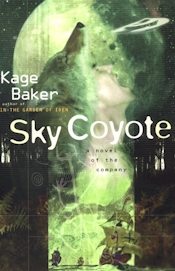
a novel of the Company
a 24th century time travel corporation
Eos Books paperback (left)
cover art by Tom Canty
292 pages
Harcourt Brace & Co. hardback (right)
cover art by Michael Koelsch

Denver Science Fiction & Fantasy Book Club |
 |
Sky Coyote (1999) a novel of the Company a 24th century time travel corporation Eos Books paperback (left) cover art by Tom Canty 292 pages Harcourt Brace & Co. hardback (right) cover art by Michael Koelsch |
 |
| Dan | 6 | Amy | 7 |
 |
10 Wow! Don't miss it 8-9 Highly recommended 7 Recommended 5-6 Mild recommendation 3-4 Take your chances 1-2 Below average; skip it 0 Get out the flamethrower! U Unfinishable or unreadable - Skipped or no rating given |
| Cheri | 7 | Barb | - | ||
| Aaron | 5 | Cynthia | 7 | ||
| Jackie | 5 | Ron | 7 | ||
| Christine | 6.5 | Mitch | 8 | ||
| Amelia | 6 |
|
Aaron's Commentary
Kage Baker - Sky Coyote An effective time travel story is very difficult to write. For all her talents, in my view Kage Baker doesn't have the knack. Baker doesn't have much fun with the paradoxes of time travel, moving through events in a pedestrian chronological sequence. She doesn't explore the boundaries of time travel in her Company universe. If recorded history cannot be changed, then what happens if you try? She doesn't work very hard to convince the reader that the Company's system would work. For century after century, the Company's immortals slave away at the bidding of their dim-witted, contemptible Twenty-Fourth Century masters. Why do they do it? Why don't they all rebel? In Sky Coyote, the characters at least ask these questions once or twice (in many Company stories they are ignored altogether), but that is not enough. These are obvious questions that occur immediately to a reader encountering Baker's Company universe. I cannot understand how the immortals could spend century after century without grappling with these issues, any more than I can understand how Baker can write entire novels in this universe without addressing them. Sky Coyote centers instead on an attempt to persuade a tribe of Native Americans to come with the immortals so their culture can be preserved. This effort is entirely trivial, because if the persuasion fails, the immortals can just knock the tribe unconscious and carry them off, or simply choose a different tribe. Spending a whole novel on this and all but ignoring the larger issues about the Company is like visiting a friend's home and commenting on the furniture without ever asking why there is an elephant standing in the living room. Baker shows little interest in making the details of her Company universe plausible. For example, her immortals talk as if they are from the present day, constantly referring to contemporary (for us) pop culture. It is amusingly anachronistic to hear Eighteenth Century characters speak in Twentieth Century idioms, but it makes no sense. The immortals might identify with the period of their birth, they might identify with the period they are residing in, or they might identify with the Twenty-Fourth Century, from which the technology for time travel and immortality originates. There is no reason for them to be particularly attached to the Twentieth Century. Certainly the Eighteenth Century Chumash Indians have no business also speaking in Twentieth Century idioms. It may be funny to hear two of the young women in the tribe talking like valley girls, but it also reminds the reader jarringly that these aren't really Eighteenth Century Chumash Indians. In a scene in the middle of the novel, the Chumash do a performance with one of them prowling around dressed as a bear. Baker explains that even though it's clearly not a real bear, the audience becomes frightened through their suspension of disbelief. Her treatment of the immortals and Chumash Indians in this novel is analogous to having that bear stand up and start juggling. It's good for a laugh, but the chuckle comes at the expense of that suspension of disbelief, without which it is all but impossible to be absorbed in the story. I credit Baker with some very witty writing. I particularly like the neurotic bureaucrats who run the immortals' hidden bases. Unfortunately, I often find Baker's writing too self-conscious. In the very first scene of the book, we watch a Spanish Jesuit in the year 1699 find his way into a mysterious lost city in the South American jungle. He sits down, and an ancient Mayan approaches and asks, "How may I serve the Son of Heaven?" The Jesuit responds, "Well, the Margarita Grande looks pretty good." That's funny stuff, but Baker immediately ruins it by telling us that it's funny: Boy, I love moments like this. I really enjoy watching the illusion coming into sharp contrast with the reality. I imagine the shock of the imaginary viewer, who must think he's walked into a British comedy sketch. Few things annoy me quite so much as a writer stopping to explain to me how clever she is. What do you think? Your comments are welcome. Please send them to vanaaron@excite.com |